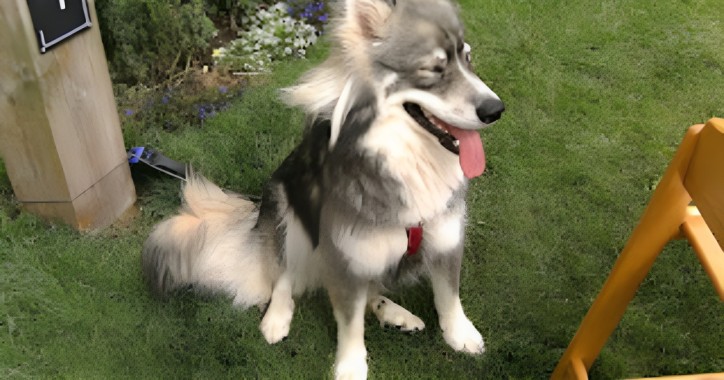Are you considering bringing home a German Shepherd Husky mix? These dogs are a unique combination of two popular breeds, each with their own distinctive characteristics.
However, proper training and socialization are crucial for this mixed breed to thrive in your home. In this article, we’ll explore the origins of the German Shepherd and Husky breeds, understand the characteristics of the mixed breed, and address common misconceptions about this furry friend.
Explaining the Uniqueness of German Shepherd Husky Mixes
Gerberian Shepskies also referred to as German Shepherd Husky mixes, are captivating canines possessing a distinct array of qualities and attributes.
These dogs are a combination of two beloved breeds, namely the German Shepherd and Siberian Husky, which contribute to their unique physical appearance and personality traits.
Typically, Gerberian Shepskies exhibit a taller stature, muscular physique, and plush coat. Their fur can showcase an array of colors including black, grey, brown, and white. Moreover, these intelligent dogs excel as both protectors and loyal companions.
Highlighting the Importance of Proper Training and Socialization
While Gerberian Shepskies, the mix of German Shepherd and Siberian Husky breeds, are known for their friendly and loyal nature, it is crucial to offer them appropriate training and socialization for their optimal well-being within your household.
These dogs possess high energy levels, necessitating sufficient exercise and mental stimulation to uphold their physical and mental health. Implementing consistent training from an early stage will aid in the cultivation of desirable behaviors, reliable recall, and obedience skills.
Understanding the German Shepherd Husky Mix
To understand the characteristics of the German Shepherd Husky mix, it’s essential to explore the origins and temperament of both breeds.
Origins of the German Shepherd and Husky Breeds
The German Shepherd breed traces its roots back to Germany in the late 19th century, when they were originally developed as working dogs. Over time, they gained recognition for their exceptional abilities and were utilized extensively in military and police roles.
These dogs are widely recognized for their intelligent nature, loyal to a fault, and protective traits.
The Siberian Husky breed originated in Siberia, Russia, as sled dogs that helped transport goods and people across snowy terrains. They are known for their independent nature, friendliness, and energy.
Overview of the Temperament and Characteristics of Both Breeds
German Shepherds are active dogs that require plenty of exercise to maintain their physical and mental wellness. They make great companions for families and are good watchdogs.
Siberian Huskies are independent dogs with a friendly and playful demeanor. They require a lot of daily exercises and mental stimulation, and they’re known to be vocal dogs. They make loyal and affectionate pets and are good with children.
Explaining the Combination of These Traits in the Mix Breed
German Shepherd Husky mixes inherit a unique set of traits from both breeds. They are intelligent, loyal, and protective dogs like their German Shepherd parent, but also possess the friendliness and energy of the Siberian Husky. This makes them great companion dogs for active families.
Addressing Common Misconceptions About the Breed
One common misconception about German Shepherd Husky mixes is that they are aggressive dogs. However, proper training and socialization will help prevent any aggressive behavior.
It’s also important to note that not all Gerberian Shepskies have aggressive traits and that proper training and socialization can prevent this behavior.
Importance of Training
Role of Training in your furry friend’s Development
Training is crucial not just for obedience but also for the physical and mental development of your furry friend. It starts with basic commands like “sit,” “stay,” and “come,” but can be extended to more complex tasks such as agility training, scent work, and herding.
Proper training also helps establish a clear communication system between you and your pet, which builds trust and ensures a lifelong bond.
Key training routines to consider
One of the most important routines to establish early on is socialization. This means introducing your furry friend to a range of people, animals, and environments so they can learn how to interact and adapt in different situations.
It’s also important to teach basic obedience commands like “sit,” “stay,” “come,” and “heel.” Remember to start with simple tasks and gradually add on more challenging ones, keeping sessions short and focused to maintain your furry friend’s attention.
Positive Reinforcement Versus Punishment-Based Methods
Positive reinforcement
Positive reinforcement is when you reward your dog for performing a desired behavior. This can be in the form of a treat, toy, or verbal praise.
By rewarding positive behavior, your furry friend will be more likely to repeat it. Positive reinforcement is known to be more effective and humane than punishment-based methods, as it motivates your furry friend to learn and encourages a happy and enthusiastic attitude toward training.
Punishment-based methods
Punishment-based methods involve correcting your furry friend for unwanted behavior by applying some form of punishment, such as a verbal reprimand or physical force.
While this can be effective in the short term, it can also lead to an anxious and unhappy pet, and may even cause aggressive behavior.
Additionally, punishment methods can damage the bond and trust between you and your furry friend.
Common Mistakes to Avoid During Training
Inconsistency
Consistency is key to any successful training routine, so it’s important to establish clear rules and boundaries from the start.
This includes consistent commands, rewards, and discipline. Inconsistent training can lead to confusion and a lack of respect for authority.
Over-reliance on treats
While treats can be a great training tool, over-reliance on them can lead to obesity and a lack of motivation from your furry friend. Make sure to mix up rewards with verbal praise and other incentives to maintain your pet’s interest in the training process.
Punishment-based methods
As outlined above, punishment-based methods can cause long-term damage to your furry friend’s mental health and may even create aggressive behavior. It’s important to rely on positive reinforcement methods to encourage desired behavior.
Socialization
Nurturing a well-rounded and vibrant German Shepherd Husky mix entails recognizing the significance of socialization.
By providing your beloved companion with appropriate social experiences, you enable them to flourish and thrive in various environments.
This invaluable practice not only fosters their comfort and confidence but also serves as a preventive measure against potential behavioral challenges that may arise in the future.
Why socialization matters
Socialization helps your dog understand and interact with the world around them. When dogs are exposed to different experiences, people, and animals, they learn new skills and coping mechanisms. Without proper socialization, a German Shepherd Husky mix may develop anxiety, aggression, and other negative behaviors.
Introducing your dog to new experiences, people, and animals
To socialize with your furry friend, gradually introduce them to new things. Start by exposing them to different sounds, smells, and sights around the house.
Once they are comfortable in their surroundings, slowly introduce them to new environments like parks, beaches, and pet-friendly stores.
Meeting new people and animals can also be a positive experience, but be mindful of your furry friend’s behavior.
Make sure they feel safe and comfortable around strangers and other pets. If they show any fear-based or aggressive behaviors, consult a professional trainer.
Developing safe and positive socialization routines
Create routines that prioritize positive reinforcement and socialization. Use treats, verbal praise, and toys to encourage your furry friend to explore and engage with new experiences. Playtime and training sessions can also help develop essential social skills, such as obedience and basic commands.
Managing aggression and fear-based behaviors
Aggression and fear-based behaviors can be managed through proper socialization and training. If your furry friend is displaying these behaviors, it’s essential to address them promptly. Enlist the help of a professional trainer who can provide guidance and develop a plan to help modify your furry friend’s behavior.
Exercise and Physical Activity
One of the most important things you can do for your German Shepherd Husky mix is to ensure they receive the right amount of exercise and physical activity.
As a mix of two high-energy breeds, the German Shepherd Husky mix requires daily exercise to maintain its health and happiness.
Lack of exercise can lead to behavioral problems such as destructive chewing, barking, and digging.
Importance of Exercise for the German Shepherd Husky Mix
The German Shepherd Husky mix is a highly active breed with a need for daily exercise. This breed is known for its high energy levels and requires both physical and mental stimulation to stay healthy and happy.
Adequate exercise can help your German Shepherd Husky mix to maintain a healthy weight, keep their muscles toned, and prevent certain health issues such as hip dysplasia and obesity.
Recommended Outdoor Activities and Games to Try
The German Shepherd Husky mix thrives on outdoor activities and games. These breeds love to run, jump, and play. Consider activities such as:
Embark on Hiking Adventures: Delve into the wilderness on long hikes, offering your furry companion the perfect blend of exercise and mental engagement. This shared experience nurtures your bond while satisfying your innate instincts.
Embrace the Joy of Running: Embodying a love for high energy, both breeds thrive on running. Take your German Shepherd Husky mix along for invigorating runs, allowing them to revel in their natural athleticism and keep their spirits soaring.
Dive into the Refreshing Waters: Capitalize on the Husky’s innate affinity for water and the German Shepherd’s appreciation for aquatic escapades. Whether it’s a pool or a serene lake, swimming offers a holistic exercise experience, benefiting your German Shepherd Husky mix both physically and mentally.
Unleash Agility Training: Channel your German Shepherd Husky mix’s penchant for learning into agility training. This dynamic activity not only provides physical and mental stimulation but also enhances their coordination and problem-solving skills. It’s an exciting way to foster growth and challenge their capabilities.
How to Identify and Prevent Injuries
While exercise plays a crucial role in keeping your German Shepherd Husky mix healthy and happy, it’s essential to watch for injuries. These breeds are prone to certain health issues such as hip dysplasia, elbow dysplasia, and arthritis. To prevent injuries:
Ensure your German Shepherd Husky mix is warmed up before any strenuous activity.
Avoid overexerting your dog in hot weather.
Provide water during and after exercise.
Inspect your dog’s paws for cuts or injuries after outdoor activities.
Addressing Common Health Issues in the Breed
German Shepherd Husky mixes are prone to certain health issues, but fortunately, most of these can be prevented or managed with proper care. These include hip dysplasia, elbow dysplasia, and arthritis. To reduce the risk of these issues:
Monitor your dog’s weight to prevent obesity.
Feed them a healthy diet to support their overall health.
Provide supplements as recommended by your veterinarian.
Exercise your German Shepherd Husky mix regularly to keep their muscles toned and joints healthy.
Feeding and Nutrition
A German Shepherd Husky Mix is a stunning breed that comes with a bundle of energy and requires proper care and feeding to maintain its energy levels. Feeding your furry friend can be a challenging task, as the difference in their size and appetite can create confusion when selecting the right nutritional balance.
Here are some things to consider when it comes to feeding and nutrition:
Nutritional requirements for the breed
To support the well-being of your German Shepherd Husky mix, it is vital to provide a well-rounded and nutritious diet. Their meals should encompass all the necessary nutrients, vitamins, and minerals essential for a thriving lifestyle.
A balanced diet for your furry companion entails a focus on high-quality protein, ensuring their muscles remain strong and resilient. Additionally, a moderate fat intake helps maintain a healthy weight while supplying them with the necessary energy.
For optimal bone health, it is crucial to incorporate ample amounts of calcium and phosphorus into their diet. These elements fortify their skeletal structure, promoting strength and vitality. Furthermore, the inclusion of essential fatty acids, such as omega-3 and omega-6, contributes to a lustrous coat and bolsters their immune system, ensuring overall well-being.
Recommended dog food brands and diets
When choosing the right dog food for your German Shepherd Husky mix, navigating through the plethora of options in the market can be overwhelming. It’s important to prioritize dog food that actively promotes their well-being and satisfies their nutritional needs.
Embrace brands like Blue Buffalo, Taste of the Wild, and Royal Canin, known for their commitment to providing high-quality nutrition. Opt for food specifically tailored to your furry friend’s breed and age, ensuring they receive the essential nutrients they require.
Avoiding toxic foods and overfeeding
Ensure the safety and health of your dog by refraining from feeding them harmful foods rich in chocolate, and avocado. Other food items to refrain from are Onions and Grapes.
Taking care not to overfeed them is essential to prevent issues like obesity and potential health concerns like joint and bone problems. Show your love and concern by providing them with the recommended daily amount of food, keeping their well-being at the forefront of your actions.
A healthy diet is critical for your Gerberian Shepsky’s overall well-being. Here’s what you need to keep in mind:
Feed your dog high-quality dog food.
Make sure your dog is getting enough protein.
Provide the right amount of food to prevent your dog from becoming overweight or underweight.
Monitor your dog’s water intake so they stay hydrated.
Dealing with Common Digestive Issues
Like all breeds, Gerberian Shepskies can suffer from common digestive issues. Here’s what you need to know:
Make sure your dog is chewing their food properly.
Feed them smaller and more frequent meals to prevent overeating.
Avoid feeding them table scraps that can upset their stomach.
Talk to your vet about any persistent digestive issues your dog may be experiencing.
Recognizing Your Dog’s True Potential
Gerberian Shepskies are highly intelligent and have a lot of potential. Here’s how you can help them achieve their potential:
Learn what motivates your dog and use it to your advantage during training.
Encourage your dog to try new activities that align with their natural abilities and interests.
Provide positive reinforcement when they achieve small milestones or achievements.
Take them to obedience classes to build their confidence and help them socialize with other dogs.
Maximizing Your Furry Friend’s Unique Talents and Abilities
Gerberian Shepskies has a unique set of talents and abilities. Here’s how you can help them shine:
Take them on hikes or other outdoor adventures to maximize their energy and strength.
Provide them with interactive toys that challenge their mental and physical abilities.
Teach them tricks and commands that align with their natural abilities.
Consider enrolling them in activities like agility or flyball to foster their natural talents.
Advancing Your Dog’s Skills Through Structured Training and Skilled Guidance
Structured training is essential for your Gerberian Shepsky to thrive. Here’s what you need to consider:
Find a reputable and experienced trainer who understands the breed’s unique needs.
Set clear goals for training, so you and your trainer are on the same page.
Regularly assess progress and adjust the training plan as needed.
Make sure your training is consistent so your dog can build on their skills and knowledge.
Understanding Your Dog’s Strengths and Weaknesses
Every Gerberian Shepsky has strengths and weaknesses. Here’s why it’s essential to understand your dog:
Knowing your dog’s strengths can help you provide the right training and activities.
Understanding their weaknesses can help you avoid situations that may cause anxiety or stress.
Take steps to overcome any weaknesses through consistent training and socialization.
Be patient and supportive during training to help your dog overcome their challenges.
Are German Shepherd Husky Mixes Good Dogs?
Yes, German Shepherd husky mixes make excellent pets and companions. They are intelligent, loyal, active, and loving dogs that thrive on attention and stimulation. With proper training and socialization, they can be a great addition to any family.
How Expensive Is a German Shepherd Husky Mix?
The price range for a German Shepherd Husky mix can fluctuate based on various elements, including the breeder, geographical location, and the age and overall health of the dog.
Typically, a Gerberian Shepsky may be priced anywhere from $300 to $1500. It is of utmost importance to seek out a trustworthy breeder who can offer a puppy that is not only in good health but also well-adjusted and socially adept.
In conclusion
German Shepherd Husky mixes are fascinating and unique dogs that require proper training and socialization.
Their intelligence, energy, and loyalty make them great companions for active families. By understanding the origins and characteristics of both breeds, you can better understand the personality traits of the Gerberian Shepskie.
Always remember that providing them with love, attention, and proper care will ensure they thrive in your home.



